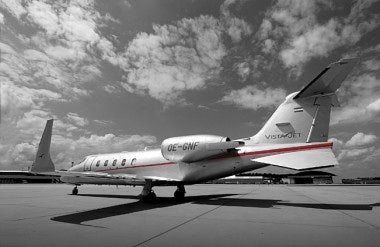VistaJet Founder, Thomas Flohr: Chinese Market Wants "The Very Best Of The Highest Luxury Available"#

VistaJet founder Thomas Flohr
Although the private aviation industry in China remains plagued by red tape and regulatory ambiguity, jet makers and private aviation operators are optimistic about the market, regularly referring to China as something of a “blank slate." With the Chinese aerospace authorities gradually loosening their tight grip on low- and, even more slowly, high-altitude airspace, and demand rising among wealthy entrepreneurs, business execs, celebrities and even government officials, the race is on to see which private aviation operators will win out in the nascent, but much-discussed mainland China market.
Recently, Jing Daily spoke to VistaJet founder Thomas Flohr and brand director Nina Flohr about some of the particularities of this rapidly developing market. With offices worldwide, including one in Hong Kong, VistaJet is currently eyeing an expanded presence in mainland China -- a country to which it currently flies Hong Kong-based clients on a nearly daily basis.
Jing Daily (JD): Thomas, can you tell us a little about how long VistaJet has been in Hong Kong, and what brought you there initially?#
Thomas Flohr (TF)#
: In 2008, I bought SkyJet from Bombardier -- they were the Flexjet subsidiary outside of the U.S. and were in Europe, the Middle East and Asia. So when I acquired SkyJet, they already had offices in Hong Kong, and obviously it was exactly the geographic area which I wanted to be covered through that acquisition.
JD: So, basically, you fell into Hong Kong but it was good timing.#
TF#
: Exactly. We acquired SkyJet in the second quarter of 2008 and I was mainly interested in their Asian and Middle Eastern operations, because we were already in Europe at that time, so [Asia] was a very geographically important point for VistaJet.
JD: How does your Hong Kong business compare with Europe or the Middle East in terms of clients?#
TF#
: At any point in time, we have two or three aircraft in the Asian region, mostly flying out of Hong Kong and they're fully booked. So to me, it [has been] very important in the last couple of years to gain the operational experience to fly in and out of China, which we do basically on a daily basis today, and that is laying the groundwork for our bigger expansion plans to eventually enter mainland China. But i didn't want to do that until I have the operational experience on the ground and people who know how to apply for the licenses and permits, where to fly in, and how to deal with the Chinese customers.
At the moment, Hong Kong is a relatively standalone Asian business. Obviously our service areas are connected with the Middle East and Europe, but it is a springboard of what we will hopefully achieve one day in mainland China.
JD: Can you tell us a little more about your specific plans for mainland China?#
TF#
: What we're now planning is to ask the question, how do we take [our China operations] to a larger scale, on par with what we achieved in Russia, in Western Europe and the west coast of Africa? So, to that extent, I'm planning another trip to China to have conversations with different parties and formulate a more detailed strategy. I feel quite positive, as I was received very positively the last two times I went to China. The Chinese market does want the very best of the highest luxury available, and we represent that brand and that deliverable of service. So, given those experiences and feedback we had, I feel highly confident that our mainland China expansion will be concluded in its strategy by the end of the year and hopefully by 2012 we can roll it out.

JD: What's been your biggest obstacle to getting into the mainland China market?#
TF#
: I want to make sure we are associated with the right people, and we've achieved that in the other markets I mentioned, such as Nigeria and Russia, and i believe as a foreigner [in China], on a standalone basis, that would not be the right approach. We've been welcomed by different parties, but it's a strategic decision, at the end of the day, who we want to be associated with. And I wouldn't say it's been an obstacle, it's been a choice, and that choice has to be made at the right time with the right people.
I think we do understand the market. It's very clear to me that the Chinese market is a very demanding one, and that actually plays in our favor because we've [catered to] that with our Russian business.
JD: In mainland China, have you sensed that airports are making more of a push towards servicing private aircraft?#
TF#
: Yes, the infrastructure is developing very quickly, but we're still waiting for more airports to open up. There was a major move about a year ago where approximately 120 airports opened up for business aviation. But currently the airports aren't so big, so you often have to fly through the main terminal. But the Chinese are catching up very fast. The business jet industry has been very well understood as an important industry by the Chinese government. It's not something just for celebrities to fly around, but is a very effective business tool that entrepreneurs and successful businesspeople are increasingly using.
JD: In terms of VistaJet's expansion into mainland China, what's going on in terms of the loosening of airspace restrictions? I know there's been plenty of discussion in recent years about deregulating lower-altitude airspace.#
TF#
: Yes, there has, but I think we don't need low-altitude airspace, we need high-altitude airspace. Commercial jets usually fly between 25,000 and 38,000 feet, but the optimal range for a business jet is between 40,000 and 45,000 feet. So everywhere else in the world, business jets are flying well above commercial jets, which conserved fuel, but we're finding that it will take a while until the Chinese aerospace authorities will allow you to fly at the optimal level. Currently they keep you flying more at the commercial level, which really would be better suited to short-hop air taxis or helicopters. But we're working with authorities there now to try to get them to change this.
JD: Now that there are domestic private aviation carriers in China, how do you see yourself competing with local competition in the Mainland?#
TF#
: Competition is always good because it validates the marketplace. You have regional companies everywhere in the world, but that doesn't necessarily have much to do with the worldwide coverage we have. We truly believe we have refined the luxury aspect of the service, and we believe that quality along with our multicultural approach and brand new aircraft means we can offer a competitive product at a good value.

VistaJet brand director, Nina Flohr
JD: Nina, can you give us a little introduction as to what you've been doing in terms of branding and image?#
Nina Flohr (NF)#
: I came into the company about two and a half years ago to assess the general image we present our clients, and quickly realized that there were many things that we could change in order to lift that experience to a higher-quality level. So I've really been spending the last two years sort of rebranding the company to create a VistaJet experience that can be an extension of our customers' lifestyles. And having been lucky enough in my life to more or less live in that world, I very much try to create sort of a family experience, something that is something you'd expect to find at home, that's not really corporate, it's more personal and intimate.
JD: How does this translate, in terms of localization for individual markets?#
NF#
: In terms of the kind of service we focus on, we call it "Glocal," meaning we're a global company with local knowledge. This is primarily something we look at when it comes to training our flight attendants. We take absolute care to make sure they know local cultural differences, so I think it very much starts with flight attendant training. Then, more or less, when it comes to the soft furnishings, there there's not so much local cultural knowledge because, I think, everybody likes a cashmere blanket. But we obviously take care with different clients, because sometimes you'll be flying in Russia where it's negative 30 degrees outside or you'll be in Abu Dhabi where it's plus 45 degrees outside.
So in order to adapt to different cultures as well as temperatures we take great care to know our customer, and this extends to the dining experience as well. We really try to create an all-around experience.
JD: Specifically looking at Asia and China in particular, do you have any set plans about how to appeal to clients there?#
NF#
: I'm planning to start spending more time in China to understand much more about how demand is locally there, but at the moment I'm rebranding some of our brochures, and we've just launched a new website, plus we're going to be working harder online to cater to Chinese clients.